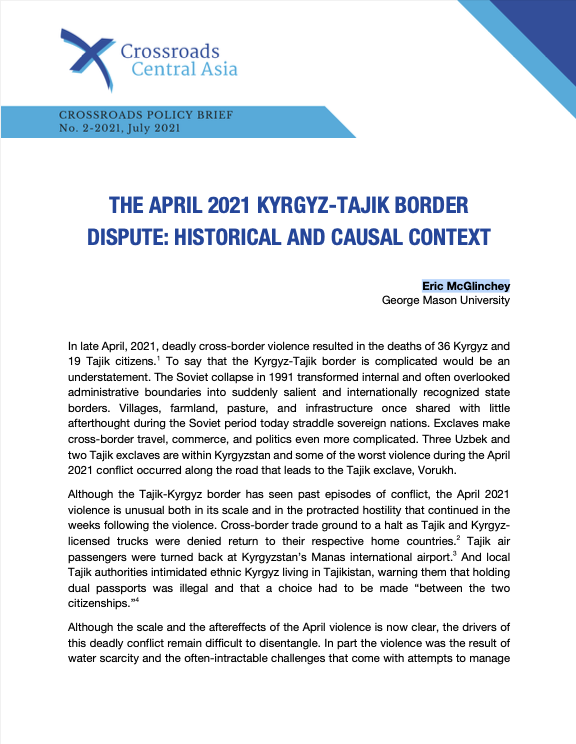Post-Soviet reforms in Kyrgyzstan during the 1990s and early 2000s included the allocation of land for long time use and eventual ownership to residents. 75% of arable land, including over 1 million hectares of agriculture land was distributed during this period. Land certificates named all family members, including minor children, and over half of all shares were distributed to women. However, census data and survey reports since initial distributions reveal that land ownership by women, and especially rural women, has significantly declined.
Search results
Showing items 1 through 9 of 119.-
Library ResourceReports & ResearchJanuary, 2021Kyrgyzstan
-
Library ResourceReports & ResearchJuly, 2021Kyrgyzstan, Tajikistan
In late April, 2021, deadly cross-border violence resulted in the deaths of 36 Kyrgyz and 19 Tajik citizens.1 To say that the Kyrgyz-Tajik border is complicated would be an understatement. The Soviet collapse in 1991 transformed internal and often overlooked administrative boundaries into suddenly salient and internationally recognized state borders. Villages, farmland, pasture, and infrastructure once shared with little afterthought during the Soviet period today straddle sovereign nations. Exclaves make cross-border travel, commerce, and politics even more complicated.
-
Library ResourceConference Papers & ReportsOctober, 2021Kazakhstan
Livestock mobility was an essential characteristic of Kazakh livestock production systems, allowing animals to take advantage of spatial and temporal variability in climate and vegetation, optimising forage intake over the year. These systems broke down following the end of the Soviet Union. In this paper we examine the extent and determinants of the recovery of mobile livestock husbandry in south-eastern Kazakhstan, using surveys and semi-structured interviews with livestock farmers and rural households (holding livestock but not registered as farms).
-
Library ResourceReports & ResearchNovember, 2021Kazakhstan
Kazakhstan’s leaders have long harbored ambitious visions for their country’s future. The country’s first President, Nursultan Nazarbayev, launched several far-reaching goals for the country’s development, most notably in 2012 the “Kazakhstan 2050” strategy, which aimed for Kazakhstan to take a place among the world’s 30 most developed states by mid-century.
-
Library ResourceReports & ResearchJanuary, 2022Kazakhstan
In 2019, the long-awaited transition of presidential power from Nursultan Nazarbayev to his anointed successor Kassym-Zhomart Tokayev took place. However, Nazarbayev continues to wield power. Among his many positions is the chair-for-life of the National Security Council, a constitutional body that has effective veto power over key policy decisions.
-
Library ResourceReports & ResearchSeptember, 2021Kazakhstan
By creating a land commission, the Kazakh authorities managed to bring down the protest rallies in 2016, when, under pressure from citizens, the government was forced to abandon the sale and lease of land to foreigners. The goal of the national patriots was achieved, but the key issue for the citizens remained unresolved – the mechanism and procedures for the return of land to the people of Kazakhstan, sold by the authorities as a result of massive corruption deals and now belonging to oligarchs – “land barons”, has not been created by law.
-
Library ResourceReports & ResearchDecember, 2018Kazakhstan
This assessment reviews ADB’s experiences in implementing gender mainstreaming in its portfolio in recent years. The assessment method has two main components. The first is a review of the status of gender equality and women’s empowerment in the country, based on a literature review, key statistics, policy documents, and key informant interviews. The second analyzes the achievements and challenges in mainstreaming gender equality in ADB’s programs and operations, and recommends the way forward to improve outcomes.
-
Library ResourceReports & ResearchFebruary, 2022Kyrgyzstan, Cambodia, Indonesia, Philippines, Bangladesh, India, Nepal, Global
Target 1.4 of the UN Sustainable Development
Goals (SDGs) seeks to ensure that “all men and women, particularly the poor and vulnerable, have equal rights … to ownership and control over land and other forms of property.” This target’s inclusion under SDG Goal 1, on “ending poverty in all its forms,” signifies a new global recognition that secure land tenure should be a central strategy in combating poverty. However, this land agenda has not been prominent in recent SDG reporting processes of governments.
-
Library ResourceReports & ResearchPolicy Papers & BriefsOctober, 2021Northern America, Central Asia, Western Asia, Europe
This publication is based on the “Study on Fraud in Land Administration Systems” presented at the Twelfth Session of the Working Party on Land Administration in 2021. It is an update to the 2011 “Study on the Challenges of Fraud to Land Administration Institutions" (ECE/HBP/165). It analyses the current state of play and best practices in addressing fraud in land administration systems in the ECE region.
-
Library ResourceReports & ResearchJanuary, 2022Africa, Tanzania, Western Africa, Asia, Central Asia, Mongolia, Global
Kwa zaidi ya miaka mitano, Mradi wa Usalama wa Umiliki wa Ardhi kwa Wanawake (WOLTS) umekuwa ukichunguza uhusiano wa kijinsia na ardhi katika jamii za wafugaji zilizoathiriwa na uchimbaji wa madini Mongolia na Tanzania. Lengo limekuwa ni kutengeneza mbinu ya ushiriki wa jamii kwa muda mrefu na kujenga uwezo wa kulinda na kusaidia haki za ardhi za watu wote walio katika mazingira magumu na hivyo kuelekeza nguvu katika usawa wa kijinsia, usimamizi na umiliki wa ardhi kwa mfumo ambao utarahisisha maboresho katika haki za ardhi kwa jamii yote.
Land Library Search
Through our robust search engine, you can search for any item of the over 64,800 highly curated resources in the Land Library.
If you would like to find an overview of what is possible, feel free to peruse the Search Guide.










